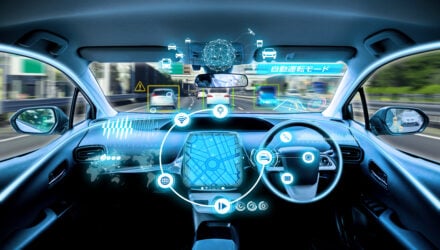
TECH: Volvo are already testing self-drive cars
In this week’s Guest Blog, Omar-Pierre Soubra of Trimble Field Service Management, provides his take on what is ahead for the industry…
The challenge of achieving field service excellence in today’s marketplace is getting tougher as spiralling customer expectations, rising fuel prices and restricted budgets continue to mar business efforts.
However, the emergence of new and developing technologies have the potential to radically shift the way field service organisations operate and transform the way work is performed to dramatically improve service.
Here are my thoughts on the upcoming technology trends field service businesses need to think about today, and how these will impact their work in the future:
Self-driving cars:
Engineering in the motor industry is developing all the time with many of the larger car manufacturers offering a steady stream of niche products, such as electric and hybrid vehicles.
Self-driving cars are also coming to the fore, which will have a major impact in the field service industry, looking forward.
For the field technician, the availability of a self-driving car will not only allow them to drive from one job destination to another, stress-free, but it will also enable them to complete other tasks while the vehicle is driving, boosting their productivity.
Some of the major features on self-driving cars include that it will halt for pedestrians and could take over the tedious parts of driving such as negotiating traffic jams or regular commutes.
By just the press of a button on a screen, the driver can let the computer take the strain.
Self-driving cars also have the ability to improve driver safety.
Currently, around 10,000 accidents take place, on average, every day, on Britain’s roads.
However this statistic could be mitigated with a self-driving car, either through drivers’ attention wandering, or through driving too close to other cars and being unable to react.
Traffic would also flow with fewer interruptions, resulting in minimal interruption to a technician’s work schedule.
It may seem that the availability of self-driving cars is very far away but technologies such as GPS, collision avoidance and logging distances between vehicles, which will be used inside self-driving cars, are already being embedded to existing cars and vans today.
Search engine giant, Google, has been working on self-driving cars for years, and has now won approval for their use in the US states of Nevada and California.
Augmented reality glasses:
Augmented reality (AR) is a live, direct or indirect, view of a physical, real-world environment whose elements are augmented by computer-generated sensory input such as sound, video, graphics or GPS data.
For field services, augmented reality in the form of glasses is an upcoming technology trend which could significantly benefit the field based workforce.
Augmented reality glasses provide the ability to send information to a worker, record what’s happening in the field and document how a job was done.
They can also be used for training purposes.
For example, if a technician needs to be trained on how to complete an installation which they may not have encountered before, augmented reality glasses can provide the user manual or information they need to complete the install successfully.
Essentially, augmented reality glasses provide the eyes to the mobile workforce to obtain information to understand what needs to be done in an all-encompassing quick and easy method, whilst providing the decision makers back in the office complete visibility of what is happening in the field.
3D Printing:
3D printing is making its mark in the field service industry as it reshapes product development and manufacturing and turns individuals into ‘makers.’
3D printing is a process of making a three-dimensional solid object of virtually any shape from a digital model.
Such a machine used to cost a small fortune but today they are widely available for a reasonable price and could prove to be a valuable asset to a field service operation.
For field services, customer satisfaction is ranked as the number one priority.
However, AberdeenGroup report that 57% of organisations say that their biggest customer complaint is that the technician does not resolve the issue first time, and a reason for this may be due to not having the right part or tools.
By having a 3D printer fixed into a technician’s van, any unavailable parts would be able to be printed on demand, achieving the ‘first time fix’ and maintaining customer satisfaction.
Additionally, 3D printers feature M2M technology and this feature can be used to prevent a breakdown.
An appliance is able to send information to a 3D printer notifying it to print a part to avoid a breakdown.
So when the technician arrives at the job, he is there, with the necessary tools and parts, to prevent a breakdown instead of fixing a problem that already happened.
Ultimately, 3D printing has the potential to eliminate the problem of not having the right part when you get to a job or not being able to dispatch a technician because he doesn’t have the necessary part in his van.
Asset management technologies are also available today that offer businesses visibility into where parts are, solving the issue of location and avoiding sending a technician with the wrong part to a customer site.




















